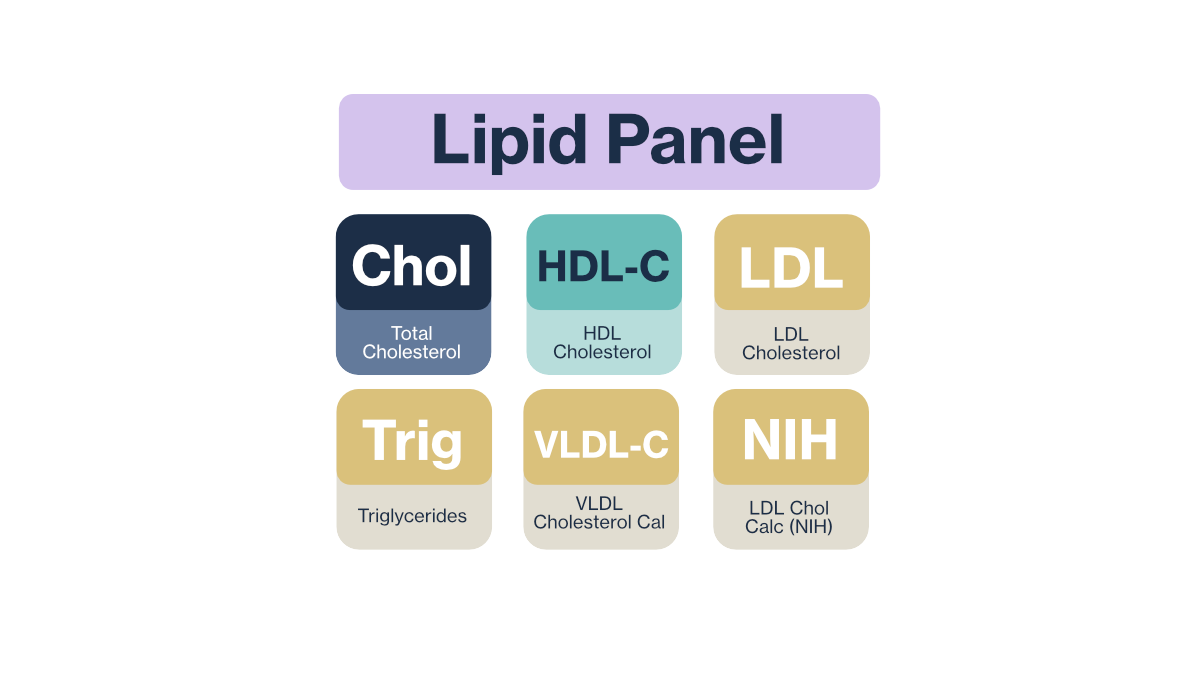AI Bloodwork Interpretation Coming December 2025
The Lipid Panel is a group of blood tests that measures the levels of fats and cholesterol in your blood. These numbers offer key insights into your cardiovascular health and your risk for conditions like heart disease or stroke. It’s one of the most common tests used to monitor long-term health and wellness.

Understanding your cholesterol and lipid levels doesn’t have to be confusing.
Each test in the Lipid Panel plays a role in assessing your heart health — from measuring “good” and “bad” cholesterol to evaluating fat levels in your blood. These results help you and your doctor gauge your risk for heart disease and make decisions about diet, exercise, and other lifestyle factors.
👉 Click “Read More” to explore simple explanations of each test — what it measures, why it matters, and what your numbers might mean for your long-term cardiovascular health.
These results help paint a picture of your heart’s health and how well your body processes and transports fat.
Cholesterol, Total – The sum of all cholesterol in your blood. This includes LDL, HDL, and VLDL. Ideal range: <200 mg/dL.
LDL Chol Calc (NIH) – Known as “bad” cholesterol. High levels may lead to plaque buildup in arteries. Your result: 116 (High); consider exploring lifestyle and dietary adjustments with your doctor.
HDL Cholesterol – “Good” cholesterol that helps remove LDL from your bloodstream. Higher levels are protective.
Triglycerides – A type of fat stored in the blood from unused calories. Elevated levels can increase heart risk.
VLDL Cholesterol – Carries triglycerides and contributes to plaque deposits. Often estimated from triglycerides.
VLDL Cholesterol Cal – A calculated estimate of your VLDL; used alongside other lipids for a clearer risk profile.
LDL Cholesterol (NIH Calc) – Repeated for emphasis, as it’s a critical number doctors monitor closely.
The information on this page is provided for educational purposes only and is not medical advice. Lab test results can vary from person to person and must be interpreted in the context of your full health picture — including your symptoms, medical history, and any medications you may be taking.
If you see a result outside the normal range, don’t panic — it doesn’t always mean something is wrong. Only a licensed healthcare provider can accurately interpret your labs and recommend appropriate next steps.
That said, we’ve included general health topics, lifestyle tips, and nutritional guidance that you may find helpful as a starting point for informed conversations with your doctor or registered dietitian.
Your lipid profile isn’t just about cholesterol. It’s about understanding how fats move through your bloodstream and whether they’re helping or hurting your heart, blood vessels, and organs. High or imbalanced cholesterol levels can silently increase the risk of heart attacks, strokes, and other cardiovascular problems — often without symptoms.
The lipid panel is primarily tied to cardiovascular health, but it also reflects metabolic activity, liver function, and how your body processes fats. While cholesterol often gets a bad rap, your body needs it — the key is keeping it in the right balance.
Total Cholesterol – Measures the total amount of cholesterol in your blood, including HDL, LDL, and VLDL. Provides a broad snapshot of your lipid profile and heart disease risk. LDL Cholesterol (LDL) – Known as “bad cholesterol.” High levels can lead to plaque buildup in arteries, raising the risk for heart attack, stroke, and atherosclerosis. HDL Cholesterol (HDL-C) – Called “good cholesterol.” Helps remove excess cholesterol from your bloodstream, providing protection against heart disease. Triglycerides – A type of fat that stores energy from unused calories. Elevated levels may point to metabolic issues, such as insulin resistance or increased cardiovascular risk. VLDL Cholesterol – Transports triglycerides through the bloodstream. High levels can contribute to plaque formation in arteries and are often linked to metabolic conditions. LDL Chol Calc (NIH) – An estimated calculation of LDL based on total cholesterol, HDL, and triglycerides. Helps assess overall cardiovascular risk when direct LDL isn’t measured.
Small changes in your daily habits can have a big impact on your cholesterol levels and overall heart health. Below, you’ll find lifestyle tips and food choices tailored to each test in the Lipid Panel — helping you better understand how your results connect to actions you can take.
These are not medical prescriptions, but helpful, research-backed insights to explore with your doctor or registered dietitian.
Name: MedlinePlus
Title: Comprehensive Metabolic Panel (CMP)
Link: https://medlineplus.gov/lab-tests/comprehensive-metabolic-panel-cmp/
Description: An overview of the CMP blood test, what it measures, why it’s ordered, and what the results might mean.
Name: MedlinePlus Genetics
Title: Gilbert Syndrome
Link: https://medlineplus.gov/genetics/condition/gilbert-syndrome/
Description: A trusted resource that explains Gilbert Syndrome, a common and usually harmless cause of slightly elevated bilirubin levels.
Important: The information provided on this website is for educational and informational purposes only. It is not intended as medical advice, diagnosis, or treatment and should not be used as a substitute for professional medical care.
Always consult a qualified healthcare provider or licensed physician regarding your individual health concerns, medical conditions, or any questions you may have about lab results, symptoms, or treatments. Never delay or disregard professional advice because of something you read here.
By continuing, you acknowledge that you understand and agree to this disclaimer.